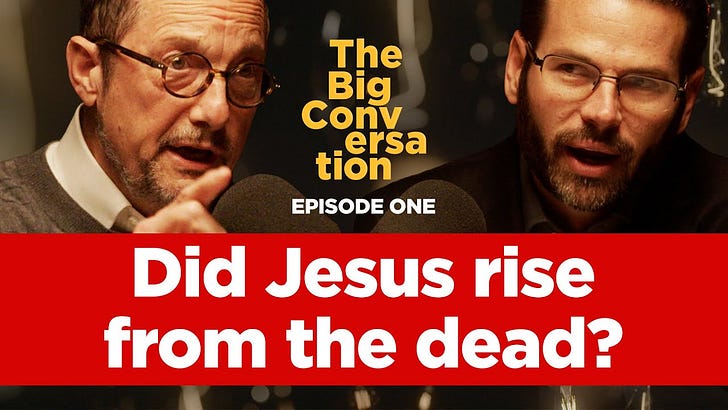A Biblical scholar (Bart Ehrman) debates a dogmatic Christian fundamentalist (Justin Bass) over the Resurrection of Jesus, aka, the first Easter
Spoiler: they don't wind up agreeing with each other.
This is a debate on the Resurrection of Jesus that provide a glimpse of the difference between academic scholarship on the Christian Bible and dogmatic fudamentalist efforts to discredit such actual scholarship in favor of a faith-based analysis1.
The caption to the video notes that this particular discussion series “is produced by Premier Unbelievable? in partnership with John Templeton Foundation,“ the latter being a well-heeled organization long known for encouraging conservative religious leanings.2
With Christian nationalism in the form of Trumpism currently dominating the Republican Party in the US, understanding the bad-faith style (no pun intended) of this kind of Christian fundamentalist argumentation helps to see why the type of arguments we see from conservative media stars like Chalie Kirk are appealing to conservative Christians.
One might wonder why a Christian fundamentalist would even care what academic scholarship says. But it has been a characteristic of Fundamentalism from its beginnings in the 19th century to not only claim that it is superior to the secular readings of the Bible but that it is also compatable with the natural science that it claims is inferior to Christian faith as a measure of reality and truth. Beating the secular heretics by pretending to argue on their own ground is a standard schtick for them.
Bart Ehrman is a Biblical scholar at the University of North Carolina at Chapel Hill who proceeds from academic standards. He began his career as an evangelical Christian but later became a non-believer. He has written a number of books presenting Biblical scholarship in a form accessible for popular audiences. His latest book is Armageddon: What the Bible Really Says about the End (2023)3. He clear enjoys his field of study and takes it seriously. He’s not doing some kind of village-atheist act.
Justin Bass is a professor at Dallas Theological Seminary, a leading academic bastion of the Southern Baptist version of Christian fundamentalism. Bass presents a "highbrow" argument for the fundamentalist interpretation of the Resurrection of Jesus from the dead. He has also published a book called Bedrock of Christianity: The Unalterable Facts of Jesus' Death and Resurrection (2020). What he is doing in this video is demonstrating to his side that he can defend the home team (Christian fundamentalists) against an apostate (someone who has abandoned the faith).
The chronic problem with these kinds of match-ups is that the two parties share basically only the topic of Jesus of Nazareth and are doing so in English. The content is like one person describing what we know of what happened to a small religious sect in ancient Palestine, while the other is describing a church choir singing in the present day. Which can make for good clickbait.
The "tell" in Bass' argument is that he insists repeatedly that the fact that there are over a billion Christians in the world today is the most important validation that Jesus physically rose from the dead. In other words, it must be right because we (Christians) believe it. The message is: it's safe for you to believe it because you have lots of company.
Ehrman sticks to the viewpoint of secular academic scholarship. He isn't making a argument that he can prove the Resurrection is wrong, or that Christians would have to give up their faith if they accept the notion that secular scholarship cannot document a physical resurrection of Jesus.
Ehrman doesn't get into it this presentation, but there is a perfectly respectable Christian theological argument that the doctrine of the Resurreciton of Jesus does not require belief in a physical reanimation of his body. This position holds that the post-Resurrection appearance of Jesus in the canonical Gospels describe him in some kind of spiritual body, doing things like appearing suddently in the middle of a group, or talking to a couple of guys on the road and suddenly disappearing into thin air, or appearing in some kind of vision to the Apostle Paul.
But that is a theological argument, and Ehrman sticks to the kind of historical and literary standards that do not depend on theological claims. Or on taking a poll of how many people believe that a claim that X that happened a couple of thousand years ago is true.
I’m sure that Bart Ehrman is aware that to some extent, appearing in a confrontation like this risks giving undue credibility to someone making dogmatic, bad-faith aqrguments more credit than he deserves. But this is Ehrman’s field, and the Christian fundamentalist viewpoint is very influential in the United States. And he understands very well about how to approach a fundamentalist argument without falling into arguing on their own terms. This presentation provides a good example.
Bart Ehrman & Justin Bass • Did Jesus of Nazareth rise from the dead? Premier Unbelievable? You Tube channel 04/07/2023.
Ehrenreich, Barbara (2007): John Templeton’s Universe. The Nation 10/10/2007.<https://www.thenation.com/article/archive/john-templetons-universe/> (Accessed: 2023-08-04).
Ehrman talks about this theme in The Biblical Apocalypse & Its Real World Consequences. Letters and Politics YouTube channel 03/27/2023.


